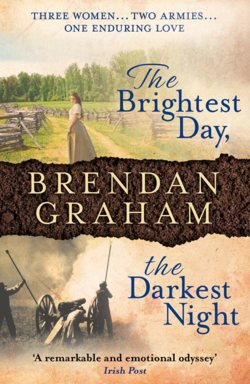Читать книгу The Brightest Day, The Darkest Night - Brendan Graham - Страница 16
NINE
ОглавлениеBy 1862, French physicist, Jean Bernard Foucault had made scientific history by measuring the speed of light using revolving mirrors. Foucault’s compatriot Victor Hugo, with his classic novel Les Miserables, was making a different kind of history. It was left to yet another Frenchman to change forever how Americans would kill Americans.
Captain Claude-Etienne Minié had supplied the world with his own particular brand of French artistry – the minié ball. This was a one-inch-long, leaden slug, the base of which, when fired from the newly-developed rifled musket would expand into the rifle’s grooves and spiral through the air as it was projected. The result was deadly accuracy at two hundred and fifty yards. And at half a mile the minié ball could still kill. The Frenchman’s invention could travel five times further than the bullet of any other weapon.
The first time Ellen saw Hercules O’Brien he had been struck by not just one minié ball but two. ‘Science will kill us all,’ he told her, ignoring his smashed arm and the furrowed groove which ran from front to back along the left side of his blocky skull.
‘What do you mean, Sergeant O’Brien?’ she asked.
‘Well, look how Science has lepped into action in this war.’
She waited till he continued.
‘Exploding mines that go in the ground, so a man, even if he is safe from battle, cannot take a walk to a leafy glade or a cooling brook for fear he step on one and be blown to smithereens.’
Ellen thought how cruel a mind had human science to invent such an inhuman device.
‘… and there isn’t a sharpshooter but has the new telescope lens. There’s no place safe left to hide … and the Gatlings, the repeating guns,’ he explained for her benefit, ‘cut a man in two, they would … leave his legs still walking and his body gone.
‘The generals are fighting with the old tactics while the men are cut to ribbons with the new weapons. General Meagher is still calling for bayonet charges. “Let them taste steel,” he says, but all we get is Rebel lead.’
‘Stop talking,’ she ordered, ‘while I bandage this head of yours!’
Hercules O’Brien paid no heed to her. ‘I’m telling you, missus, before the century is out, Science will be the master of mankind. Science will blow up the world!’
Whatever about ‘Science blowing up the world’, Ellen had already seen the devastating results of the minié ball.
The old round musket ball used early on by the Confederates, would pierce clothing and skin but would bounce off the deeper tissues. The conical minié ball however would bore through all tissue, usually resting near the opposite side of the body to which it had entered. If it did not exit entirely, it left a trail of destruction in its wake.
Now, his head at last bandaged, she gently pushed a probing finger into the sergeant’s other wound. The human finger still more sensitive than what Science could produce. And less likely to damage arteries and nervous tissues.
She kept looking at him, talking, feeling the tension rise within him; wondering how this pint-sized man had earned the name of Hercules?
‘I’m a great big man in a little man’s body,’ he said seriously. ‘Hercules lived in ancient times and he lifted the world on his back … and sure amn’t I carrying the whole Union army on mine!’
She looked at him. His visible eye, from where she had just bandaged him, was dancing with mirth. At last her fingertip found something hard and solid.
‘I’ve found it, Sergeant O’Brien!’ she said.
‘No matter that science will kill us all, you can’t beat the human touch.’ He winked at her, the eye still working overtime.
‘Well, I will need the forceps with which to get it out,’ she countered.
The thin Moses forceps with the sharp beak soon had her gingerly withdrawing the minié ball. He never complained and when she showed him the bloodied missile, he said, ‘Thank you, ma’am. I’d like to keep it as a souvenir ’case I collect no more of them!’
‘You were lucky, Sergeant O’Brien,’ she said. ‘No splintering … and that the second one skidded from your head, rather than collided with it.’
‘Would have made no differ ma’am,’ Hercules O’Brien answered, tapping his skull. ‘Not even the damned minié ball could get in there.’
Later, she came back, asked him if he’d come across a soldier named Lavelle O’Malley, thinking by now that both Patrick and Lavelle would have enlisted. Because it seemed as if all the rest of America had.
‘No, ma’am,’ he answered, watching her. ‘Three-quarters of America is out there … and half of Ireland. What brigade is he with?’
When she couldn’t tell him he enquired, ‘Is he your husband, ma’am?’
‘He was …’ she almost said, then corrected herself. ‘Yes.’
